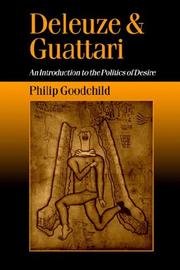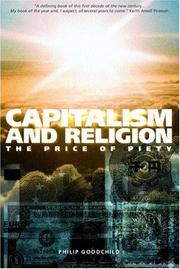| Listing 1 - 2 of 2 |
Sort by
|

ISBN: 1446250431 0803976003 0803976011 1848609671 1283880709 0585329966 9781848609679 9780585329963 9780803976016 9780803976009 9781446250433 9781283880701 Year: 1996 Publisher: London ; Thousand Oaks, Calif. : SAGE,
Abstract | Keywords | Export | Availability | Bookmark
 Loading...
Loading...Choose an application
- Reference Manager
- EndNote
- RefWorks (Direct export to RefWorks)
Divided into three sections - knowledge, power and desire - this book provides a systematic account of the intellectual context and an exhaustive analysis of the key themes informing Deleuze and Guattari's work.
20th century. --- Deleuze, Gilles. --- Guattari, Félix. --- Philosophy, Modern. --- Philosophy. --- Sociology. --- Philosophy, Modern --- Psychology, Pathological --- Schizophrenia --- Capitalism --- Social psychiatry --- Social sciences --- Philosophy & Religion --- Philosophy --- Etiology --- Social aspects --- -Philosophy, Modern --- -Psychology, Pathological --- -Schizophrenia --- -Social psychiatry --- -Behavioral sciences --- Human sciences --- Sciences, Social --- Social science --- Social studies --- Civilization --- Psychiatry, Social --- Clinical sociology --- Mental health --- Psychiatry --- Social medicine --- Social psychology --- Dementia praecox --- Schizophrenic disorders --- Psychoses --- Schizotypal personality disorder --- Abnormal psychology --- Diseases, Mental --- Mental diseases --- Mental disorders --- Pathological psychology --- Psychology, Abnormal --- Psychopathology --- Neurology --- Brain --- Criminal psychology --- Psychoanalysis --- Modern philosophy --- Market economy --- Economics --- Profit --- Capital --- Diseases --- Deleuze, Gilles --- -Guattari, Felix --- -Criticism and interpretation --- Criticism and interpretation --- Social psychiatry. --- Social aspects. --- Etiology. --- -Social aspects --- -Psychiatry, Social --- Behavioral sciences --- Guattari, Félix, --- Deleuze, G. --- Delëz, Zhilʹ, --- Dūlūz, Jīl, --- دولوز، جيل --- Guattari, F. --- Guattari, Pierre-Félix, --- Gvattari, Feliks, --- Social philosophy --- Social theory --- Deleuze, Gilles, --- Criticism and interpretation. --- Guattari, Felix --- Delezi, Jier, --- Guattari, Felix,

ISBN: 0415282241 0415282233 1280054719 0203398416 1134459521 9780203398418 9781134459476 9781134459513 9781134459520 9780415282239 9780415282246 1134459513 Year: 2002 Publisher: London New York Routledge
Abstract | Keywords | Export | Availability | Bookmark
 Loading...
Loading...Choose an application
- Reference Manager
- EndNote
- RefWorks (Direct export to RefWorks)
Our global ecological crisis demands that we question the rationality of the culture that has caused it: western modernity's free market capitalism. Philip Goodchild develops arguments from Nietzsche, Adorno, Horkheimer, and Marx, to suggest that our love of Western modernity is an expression of a piety in which capitalism becomes a global religion, in practice, if not always in belief. This book presents a philosophical alternative that demands attention from philosophers, critical theorists, philosophers of religion, theologians, and those in ecological politics.
| Listing 1 - 2 of 2 |
Sort by
|

 Search
Search Feedback
Feedback About UniCat
About UniCat  Help
Help News
News